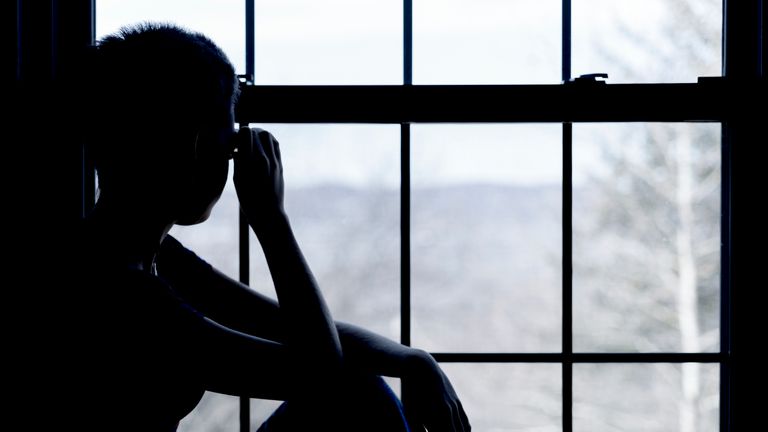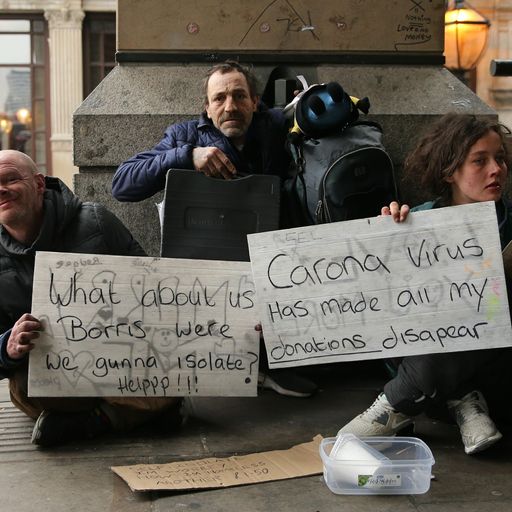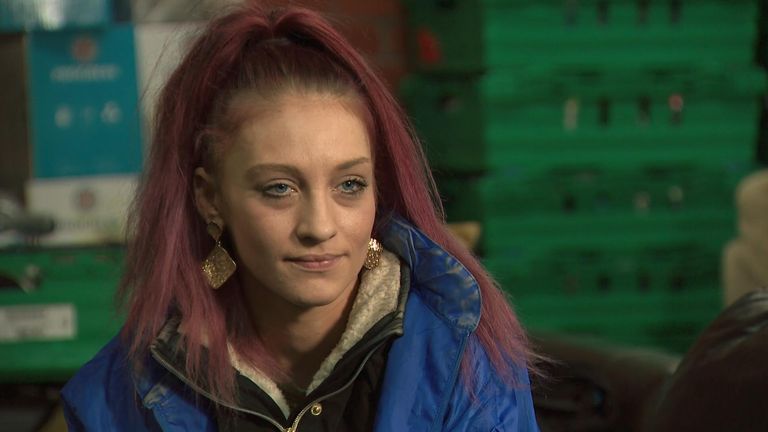Homeless people in temporary housing at highest level since 2006 - as some trapped in 'intolerable' conditions
Campaigners say poor conditions and overcrowding are rife in the emergency B&Bs where one in six homeless households are placed.
By Ivor Bennett, news reporter SKY NEWS
Thursday 17 December 2020

The number of people in temporary accommodation has increased by 83% within a decade.
More than a quarter of a million people in England are homeless and living in temporary accommodation, new figures show.
There were an estimated 253,620 people without a secure home at the end of June this year, according to housing charity Shelter.
The figure is the highest it has been since 2006 and has increased by 83% in the last decade.
More than a quarter of a million people in England are homeless and living in temporary accommodation, new figures show.
There were an estimated 253,620 people without a secure home at the end of June this year, according to housing charity Shelter.
The figure is the highest it has been since 2006 and has increased by 83% in the last decade.

The analysis of government data shows an extra 6,000 people were relying on temporary accommodation after the first three months of the pandemic.
But campaigners believe the true number of people experiencing homelessness is much higher than the figures suggest, fearing many rough sleepers are undocumented by councils.
"What we've got is a pre-existing housing crisis that's kind of collided with the worst public health crisis in living memory and these people are caught in the fallout of that," Shelter's chief executive Polly Neate told Sky News.
"We are seeing people seeking our help at an alarming rate and without more public support we are struggling to keep up with demand."
Temporary accommodation provided by councils can range from a self-contained flat to an emergency B&B room with shared facilities.
One in six homeless households (17%) are currently placed in emergency B&Bs and hostels, where campaigners say poor conditions and overcrowding are rife.
The use of emergency B&Bs alone has increased by a staggering 371% over the last 10 years.
"I've seen families, mum and three kids, in one room on a corridor with a communal bathroom at one end and a communal kitchen at the other," Ms Neate said.
"Those conditions become almost intolerable - both for people's physical health and for people's mental health. The impact has been really severe during the pandemic."
Farhad Izadi became homeless after separating from his partner last Christmas.
When standing in the middle of his hostel room in Harrow, northwest London, he is able to touch the ceiling with one hand and the wall by his bed with the other.
Balancing on one leg and stretching out his foot, he makes contact with the opposite wall while his other limbs stay in place.
"I wouldn't call it a room, I would call it a box," Mr Izadi told Sky News.

Farhad Izadi describes his accommodation as like living in a 'box'
As well as being cramped, he said his accommodation is unhygienic and unsafe. He shares a bathroom and kitchen with 20 other residents, some of whom he claims are abusive and violent.
"There are people over there, coming out with knives, threatening people," he said.
"It's a nightmare really. I'm trying to be positive because I don't have any other option at the moment. I try to find any opportunity to go out of that place."
The only time Mr Izadi spends at the hostel is at night.
He cooks at 3am when the kitchen is empty, while his days are spent volunteering at a community library - the only place that offers an escape from a predicament that has left him suffering from depression and anxiety.
"I used to say it's my second home but now perhaps I should say it's my first home because I spend a lot of time here," he said.
"Even if you're the healthiest person on the planet, if you live there after a few months it's impossible not to be depressed or suffer from anxiety."

Play Video - Plight of the homeless forced to live in bed and breakfast accommodation
More than two-thirds (68%) of all homeless people living in temporary accommodation are in London, equating to one in every 52 people in the capital.
In London, Newham has the highest rates of people in temporary accommodation (one in 23), followed by Haringey (one in 28), and Kensington and Chelsea (one in 29).
Outside of the capital, Luton has the highest rate of people in temporary accommodation (one in 55). This is followed by Brighton and Hove (one in 78), Manchester (one in 93) and Birmingham (one in 94).
A Ministry of Housing, Communities and Local Government spokesperson told Sky News that reducing the number of households in temporary accommodation is a priority and that the government is investing more than £750m to tackle homelessness and rough sleeping next year.
As well as being cramped, he said his accommodation is unhygienic and unsafe. He shares a bathroom and kitchen with 20 other residents, some of whom he claims are abusive and violent.
"There are people over there, coming out with knives, threatening people," he said.
"It's a nightmare really. I'm trying to be positive because I don't have any other option at the moment. I try to find any opportunity to go out of that place."
The only time Mr Izadi spends at the hostel is at night.
He cooks at 3am when the kitchen is empty, while his days are spent volunteering at a community library - the only place that offers an escape from a predicament that has left him suffering from depression and anxiety.
"I used to say it's my second home but now perhaps I should say it's my first home because I spend a lot of time here," he said.
"Even if you're the healthiest person on the planet, if you live there after a few months it's impossible not to be depressed or suffer from anxiety."

Play Video - Plight of the homeless forced to live in bed and breakfast accommodation
More than two-thirds (68%) of all homeless people living in temporary accommodation are in London, equating to one in every 52 people in the capital.
In London, Newham has the highest rates of people in temporary accommodation (one in 23), followed by Haringey (one in 28), and Kensington and Chelsea (one in 29).
Outside of the capital, Luton has the highest rate of people in temporary accommodation (one in 55). This is followed by Brighton and Hove (one in 78), Manchester (one in 93) and Birmingham (one in 94).
A Ministry of Housing, Communities and Local Government spokesperson told Sky News that reducing the number of households in temporary accommodation is a priority and that the government is investing more than £750m to tackle homelessness and rough sleeping next year.
More from Homelessness
Study reveals temporary housing crisis in England
The charity Shelter has called for public help, saying more than a quarter of a million people in England are ‘trapped’ in emergency accommodation.
The charity Shelter says there is a desperate shortage of homes for social rent amid a crisis regarding temporary accommodation in England (Tim Crocker/Riba/PA)
By Trevor Marshallsea, PA
December 17 2020
More than a quarter of a million adults and children in England are homeless and living in temporary accommodation during the pandemic, according to a new report.
Standing at 253,000, the figure is the highest such total in the country in 14 years, the investigation by the charity Shelter says.
The charity’s Homeless and Forgotten study highlights what it calls England’s “housing emergency”, and says a lack of social homes “is leaving thousands stuck in unstable temporary accommodation with nowhere else to go”.
The report says 115,000 more people are living in temporary accommodation in England than 10 years ago, with the use of emergency B&B housing – usually arranged by local councils – leaping 371% in that period.
Shelter says Covid-19 risks “turbo-charging” the housing crisis, citing Government data showing the number of people affected jumped by 6,000 in the first three months of the pandemic
By Trevor Marshallsea, PA
December 17 2020
More than a quarter of a million adults and children in England are homeless and living in temporary accommodation during the pandemic, according to a new report.
Standing at 253,000, the figure is the highest such total in the country in 14 years, the investigation by the charity Shelter says.
The charity’s Homeless and Forgotten study highlights what it calls England’s “housing emergency”, and says a lack of social homes “is leaving thousands stuck in unstable temporary accommodation with nowhere else to go”.
The report says 115,000 more people are living in temporary accommodation in England than 10 years ago, with the use of emergency B&B housing – usually arranged by local councils – leaping 371% in that period.
Shelter says Covid-19 risks “turbo-charging” the housing crisis, citing Government data showing the number of people affected jumped by 6,000 in the first three months of the pandemic
253,000
People who are homeless and living in temporary accommodation in England
Shelter
The charity says the country is suffering from a desperate shortage of social homes and has issued a plea to the public to lends its support to the charity to help those affected, especially over Christmas and winter.
“Over a quarter of a million people – half of them children – are homeless and stuck in temporary accommodation,” Shelter’s chief executive Polly Neate said in a statement.
“This should shame us all. With this deadly virus on the loose, 2020 has taught us the value of a safe home like never before. But too many are going without, because of the chronic lack of social homes.
“Many people will spend Christmas in grim, dangerous places, cut off from loved ones and faced with a daily struggle to eat or keep clean.
“As the country continues to reel from the financial shockwaves caused by the pandemic, our services will do all they can to support those battling homelessness.
“This year has been unbelievably tough, but with the public’s generous support we will do our best to give hope and help to everyone who needs us.”
Shelter conducted interviews with 21 homeless families and individuals “trapped” in temporary accommodation for its report.
It said the shared experiences revealed from the interviews were feelings of isolation, “not being able to stay safe”, poor diets, difficulties keeping clean and negative impacts on mental wellbeing.
It’s a complete nightmare. We don’t feel safe, it’s always noisy, you don’t know who you’re living next to Jenny, temporary housing dweller
One interviewee, Jenny, was living with her two toddlers in temporary accommodation in south-west London described as a “tiny, self-contained flat is in extremely poor condition”.
“It’s a complete nightmare,” she told Shelter. “We don’t feel safe, it’s always noisy, you don’t know who you’re living next to. The police are always around – someone tried to break down our door once, which was terrifying. It’s so difficult to do simple things like your laundry.
“The kids sleep on the sofa. There’s barely any space for them to eat – let alone play. I can’t let them play in the garden because there are needles and broken glass.
“This is no place to bring up a family. I worry constantly about what impact this is having on them.”
To donate to Shelter’s urgent winter appeal visit www.shelter.org.uk/donate
PA

No comments:
Post a Comment